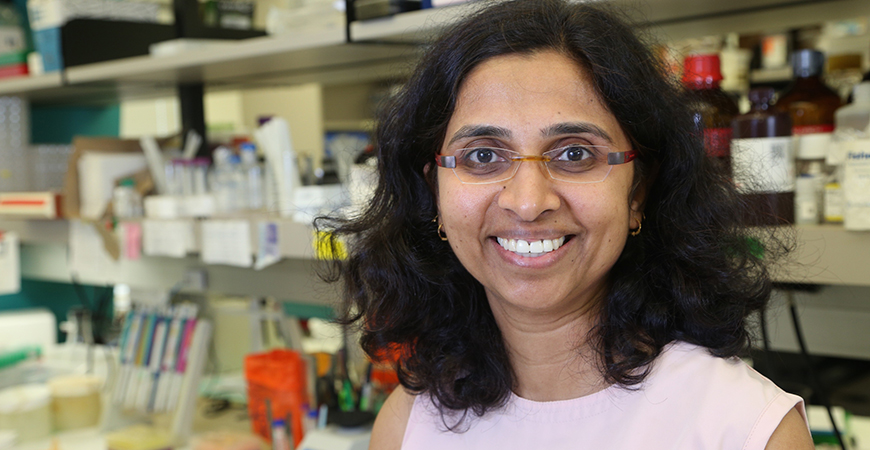Research News
Trivedi Earns Minority-serving Institution Faculty Scholar in Cancer Research Award from American Association for Cancer Research
UH College of Pharmacy Assistant Professor Meghna V. Trivedi, Pharm.D. ('03), Ph.D. ('04), BCOP, received a Minority-serving Institution Faculty Scholar in Cancer Research Award from the American Association for Cancer Research (AACR) to present her latest research results at the AACR 2016 Annual Meeting April 16-20 in New Orleans.
AACR Minority-serving Institution Faculty Scholar in Cancer Research Awards are presented to scientists at the level of assistant professor or above at a minority-serving institution, who are engaged in meritorious basic, clinical, or translational cancer research.
During the AACR meeting poster sessions, Trivedi presented her projects entitled "Role of GPR110 on tumorigenesis and metastasis in HER2+ breast cancer in the context of anti-HER2 drug resistance" and "CTCs and CTC clusters in breast cancer patient-derived xenograft models."
Supported by a multiyear U.S. Department of Defense research grant, the first project is based on Trivedi's work to identify novel drug targets to overcome drug resistance in breast cancer therapy. Trivedi is targeting a specific protein receptor, GPR110, that is part of a G protein-coupled receptor family whose members are the target of more than 30 percent of FDA-approved drugs with well-known, long-established safety profiles. In certain breast cancers, there is a gene amplification and overexpression of the protein human epidermal growth factor receptor-2 (HER2) that plays an important role in the development and progression of the disease. However, treatment of the cancer with anti-HER2 drug regimens can be confounded by resistance mechanisms that have not yet been fully defined.
In collaboration with colleagues at the Dan L. Duncan Comprehensive Cancer Center at Baylor College of Medicine, Trivedi's group identified significantly higher GPR110 gene overexpression in drug-resistant cell lines as well as lower cell growth and proliferation after knocking out (or silencing) the GPR110 gene.
Coauthors on the project were former UHCOP lab members Debashish Sahay, Ph.D., Puja Yadav, Ph.D., and Pavel Christiny, B.S.; current UHCOP lab member Raksha R. Bhat, M.S.; and BCM's C. Kent Osborne, M.D., professor and director of the Duncan Center, and Mothaffar Rimawi, M.D., and Rachel Schiff, Ph.D., associate professors.
In the second project, Trivedi's presentation covers her latest work in collaboration with BCM and commercial technology company RareCyte Inc. Trivedi and her collaborators are investigating an elusive type of cancer cells called circulating tumor cells (CTCs) and a phenomenon known as CTC clusters in which two or more CTCs are aggregated.
The team is working to develop a novel tool for monitoring and predicting response to cancer chemotherapy and overall treatment outcomes using breast cancer patient-derived xenograft mouse models. In this project, the researchers found "dynamic and differential effects of chemotherapy regimens on single CTCs and CTC clusters, potentially reflecting the genetic characteristics of tumors and their unique response to the selected chemotherapy agents." The study provided further evidence of using CTCs and CTC clusters to assess the presence of tumor-specific mutations as well as the adaptation of an existing commercial technology by RareCyte Inc. to analyze smaller blood volume available from the model.
Trivedi's previous work on CTCs/CTC clusters in the xenograft mouse model, which was published in the journal Breast Cancer Research last year, was honored with the Hematology-Oncology Pharmacy Association's 2016 Basic Science and Clinical Research Literature Award in March.
Coauthors on the project were Sahay, Bhat, Osborne, Rimawi, and Schiff along with BCM colleagues Michael T. Lewis, Ph.D., associate professor, Lacey E. Dobrolecki, M.S., research associate, and Agostina Nardone, Ph.D., postdoctoral associate; and RareCyte's Eric P. Kaldjian, M.D., chief medical officer, and Jackie L. Stilwell, Ph.D., principal scientist/research manager.
– by Chip Lambert
Media Inquiries: Chip Lambert, dlambert@uh.edu, 713-743-1286
